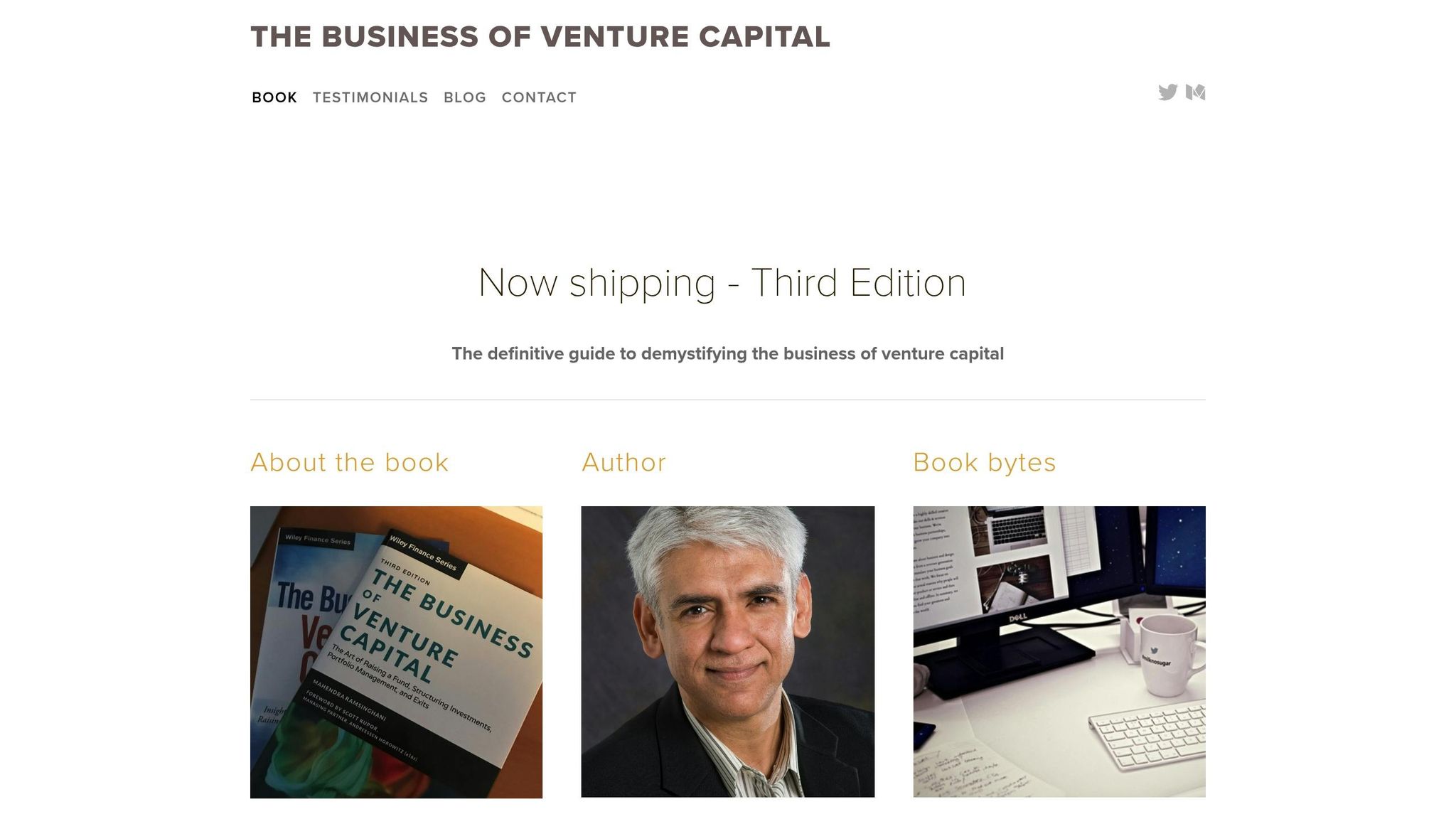Venture capital (VC) and private equity (PE) are two key investment strategies, each targeting different types of businesses and growth stages:
- Venture Capital: Focuses on startups and early-stage companies with high growth potential. VC involves higher risks but offers the chance for significant returns.
- Private Equity: Targets mature businesses, aiming to improve operations, restructure finances, and maximize long-term value.
Why Learn About VC and PE?
Understanding VC and PE can benefit entrepreneurs, finance professionals, business students, and executives by providing insights into funding, deal-making, and growth strategies.
Best Books to Start With:
Venture Capital:
- 'The Business of Venture Capital' by Mahendra Ramsinghani: Covers deal structures, portfolio management, and exit strategies.
- 'The Hard Thing About Hard Things' by Ben Horowitz: Real-world advice on managing VC-backed companies.
- 'Venture Deals' by Brad Feld and Jason Mendelson: Explains term sheets, valuations, and legal frameworks.
Private Equity:
- 'Masters of Private Equity and Venture Capital' by Robert Finkel and David Greising: Explores deal sourcing, value creation, and risk management.
- 'King of Capital' by David Carey and John E. Morris: Examines the evolution of private equity and major buyouts.
- 'Private Equity at Work' by Eileen Appelbaum and Rosemary Batt: Analyzes the impact of private equity on companies and employees.
Quick Comparison:
| Aspect | Venture Capital | Private Equity |
|---|---|---|
| Focus | Startups and innovation | Mature businesses and restructuring |
| Risk | High | Moderate |
| Investment Goal | Rapid growth and market disruption | Long-term value creation |
| Key Books | 'Venture Deals', 'The Hard Thing...' | 'King of Capital', 'Private Equity...' |
These books are essential for anyone looking to understand the principles and strategies behind venture capital and private equity.
Private Equity vs Venture Capital (EXPLAINED)
Top Venture Capital Books
Understanding venture capital requires a solid grasp of key investment principles and startup dynamics. Below, we review some essential books that break down VC strategies and concepts.
'The Business of Venture Capital' by Mahendra Ramsinghani

Mahendra Ramsinghani provides a practical guide to venture capital, covering critical aspects like:
| Topic | Details Covered |
|---|---|
| Deal Structure | Fund formation, term sheets, and investment documentation |
| Portfolio Management | Monitoring investments and creating value for startups |
| Exit Strategies | Preparing for IPOs, mergers, acquisitions, and timing decisions |
The book dives deep into fund economics and risk assessment, offering a clear understanding of the mechanics behind startup investments.
'The Hard Thing About Hard Things' by Ben Horowitz

Ben Horowitz draws from his experience as an entrepreneur and venture capitalist to share real-world advice on:
- Navigating crises while maintaining strong investor relationships
- Building and scaling effective teams
- Managing board dynamics and stakeholder expectations
This book is a must-read for grasping the challenges of managing and growing VC-backed companies.
'Venture Deals' by Brad Feld and Jason Mendelson

'Venture Deals' is a go-to resource for understanding the intricacies of venture capital transactions. It provides insights into:
| Area | Key Takeaways |
|---|---|
| Term Sheets | Common provisions and negotiation strategies |
| Valuation | Approaches to determining a company's worth |
| Investment Rounds | The progression from seed funding to later-stage financing |
| Legal Framework | Legal aspects involved in venture capital deals |
Together, these books offer a comprehensive look at venture capital from both the investor's and entrepreneur's perspectives, making them essential reading for anyone looking to understand the VC world.
Top Private Equity Books
Private equity focuses on established companies, utilizing specific financial strategies to drive growth and returns. These books break down the principles, tactics, and frameworks that define the private equity world.
'Masters of Private Equity and Venture Capital' Analysis
Robert Finkel and David Greising simplify private equity concepts into actionable strategies. Key topics include:
| Topic | Key Insights |
|---|---|
| Deal Sourcing | How to identify undervalued businesses and market opportunities |
| Value Creation | Techniques for improving operations and repositioning companies strategically |
| Exit Planning | Timing and preparing for successful exits |
| Risk Management | Methods to reduce risks and safeguard returns |
The book also includes case studies of notable transactions, providing practical examples.
'King of Capital' Review

David Carey and John E. Morris dive into Blackstone's journey and the broader private equity landscape. Key areas covered:
| Focus Area | Coverage |
|---|---|
| Historical Context | The evolution of private equity from its origins to current practices |
| Deal Mechanics | How major buyouts are structured and executed |
| Industry Evolution | Changes in strategies as the market adapts over time |
| Risk Assessment | Factors that contribute to both successes and failures in investments |
Additional Private Equity Reading
For those looking to expand their understanding of private equity strategies and impacts, these books are worth exploring:
-
'Private Equity at Work' by Eileen Appelbaum and Rosemary Batt
A detailed look at how private equity affects companies and employees, analyzing the results of various strategies on business performance and workplace outcomes. -
'Private Equity Laid Bare' by Ludovic Phalippou
This book uses real-world examples to explain leveraged buyouts and industry practices, offering a critical perspective on the private equity sector. -
'The New Tycoons' by Jason Kelly
An exploration of how private equity firms have grown from small partnerships to major players in the global financial market.
These books provide a comprehensive view of private equity, from operational strategies to its broader economic impact.
sbb-itb-1ae7b2a
Book Comparison Guide
Main Topics Covered
Books on venture capital and private equity cater to different business stages and audiences. Venture capital books focus on startups, early-stage companies, and strategies for securing initial funding. On the other hand, private equity books delve into managing mature businesses, corporate strategy, financial planning, and fostering long-term growth.
| Focus Area | Venture Capital Books | Private Equity Books |
|---|---|---|
| Business Stage | Startups and early-stage companies | Mature businesses and established firms |
| Primary Topics | Startups, innovation, early funding | Corporate strategy, financial planning, growth |
This comparison highlights the unique focus of each category, helping readers choose based on their needs.
Reader Guide by Role
Different readers can gain specific insights depending on their professional objectives:
- Entrepreneurs: Those building startups can learn from venture capital books, which cover startup strategies, innovation, and securing early-stage funding.
- Investment Professionals: Investors can use venture capital books for early-stage opportunities and private equity books for managing established companies.
- Business Students: Students benefit from a structured progression - starting with foundational concepts in both fields and moving to detailed case studies that explain market trends and investment strategies.
Book Comparison Table
| Book Category | Primary Value | Best For | Key Takeaways |
|---|---|---|---|
| Venture Capital Focus | Insights into startup strategies and funding | Entrepreneurs and early-stage investors | Focus on innovation and securing initial capital |
| Private Equity Focus | Managing mature business transformation | Finance professionals and executives | Emphasis on corporate strategy and long-term growth |
| Holistic Investment Views | Broad understanding of investment approaches | Business students and generalists | Overview of market trends and core principles |
Reading Recommendations
Main Learning Points
Dive into venture capital and private equity with focused reading to build a strong foundation. Here's what you'll learn:
Key Concepts in Venture Capital:
- How to assess startup valuations
- Strategies for securing funding
- Evaluating risks in investments
- Understanding market shifts and trends
Core Ideas in Private Equity:
- Techniques for corporate restructuring
- Methods to drive value in businesses
- Approaches for scaling and growth
- Building and analyzing financial models
Where to Start Reading
Pick your starting point based on your current knowledge and experience level:
| Experience Level | Recommended Starting Point | Topics to Explore |
|---|---|---|
| Beginners | Introductory books | Basics of investing, market fundamentals |
| Intermediate | Specialized literature | Venture capital or private equity, depending on your goals |
| Advanced | Case studies | Complex theories, real-world applications |
For tailored advice based on your role - whether you're an entrepreneur, investor, or student - check out the Reader Guide by Role in the Book Comparison Guide from the previous section.
FAQs
What are the key differences between venture capital and private equity when it comes to their investment strategies and objectives?
Venture capital (VC) and private equity (PE) differ significantly in their investment approaches and goals. Venture capital typically focuses on funding early-stage startups and high-growth companies with innovative ideas or technologies. These investments are often higher risk but come with the potential for substantial returns if the company succeeds.
On the other hand, private equity usually targets more established businesses that may require restructuring, operational improvements, or expansion. Private equity firms often acquire majority stakes in companies and aim to increase their value before selling them for a profit. While both fields involve investing in businesses, their strategies, risk levels, and target companies set them apart.
What’s the best way for entrepreneurs to decide between venture capital and private equity based on their business stage?
The choice between venture capital (VC) and private equity (PE) depends largely on your business’s growth stage and funding needs. Venture capital is typically more suitable for early-stage startups looking for growth capital and strategic guidance. VC investors often focus on high-risk, high-reward opportunities, especially in industries like technology and innovation.
Private equity, on the other hand, is generally aimed at more mature companies that are already generating steady revenue. PE firms often invest larger sums to help businesses scale, restructure, or achieve long-term growth. Understanding your company’s current stage, goals, and risk tolerance can help guide your decision.
What are the best books to help finance professionals understand the differences between venture capital and private equity?
To gain a solid understanding of both venture capital and private equity, finance professionals should explore books that delve into the key principles, strategies, and real-world applications of these fields. Some highly recommended titles include:
- Venture Deals: Be Smarter Than Your Lawyer and Venture Capitalist by Brad Feld and Jason Mendelson - A practical guide to understanding how venture capital deals are structured and negotiated.
- Private Equity at Work: When Wall Street Manages Main Street by Eileen Appelbaum and Rosemary Batt - A comprehensive look into the impact of private equity on businesses and employees.
- The Masters of Private Equity and Venture Capital by Robert Finkel and David Greising - Insights from industry leaders on how they achieved success in both fields.
These books provide valuable perspectives on the similarities and differences between venture capital and private equity, making them essential reads for professionals looking to deepen their knowledge.


